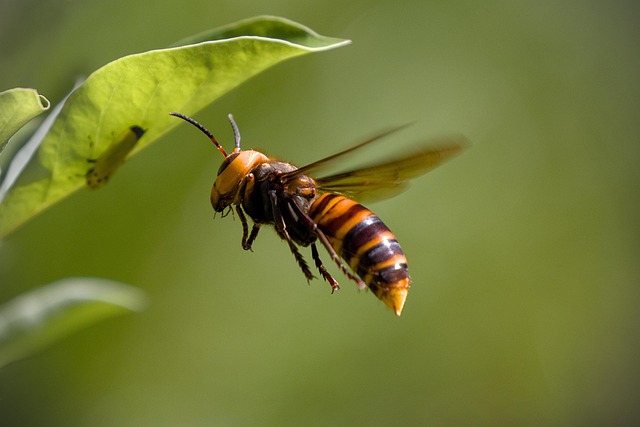Hornets exhibit distinct seasonal behaviors that impact colony development and food gathering. Spring sees queen nesting and increased worker activity for protein-rich food, summer brings rapid colony growth and heightened aggression, while fall focuses on energy storage. Commercial hornet nest control professionals use advanced techniques and chemicals to target active nests, disrupt lifecycles, and prevent established colonies. Year-round strategies involve regular inspections, early nest detection, targeted treatments, habitat manipulation, and proactive management by specialized teams. These programs offer significant advantages for residential and commercial properties, enhancing safety, preventing damage, and maintaining hygiene standards through eco-friendly methods.
Hornets, with their growing presence year-round, demand proactive strategies. This article explores seasonal prevention programs for comprehensive hornet control, delving into their behavior and seasonal patterns. We examine the effectiveness of commercial hornet nest control as a key strategy, while offering practical, year-round solutions. From understanding their life cycles to implementing tailored measures, these approaches ensure ongoing protection, providing peace of mind in all seasons. Discover the benefits and considerations for efficient hornet management through sustainable practices.
Understanding Hornet Behavior and Their Seasonal Patterns
Hornets, like many insects, exhibit seasonal behaviors that influence their colony development and food-gathering activities. Understanding these patterns is key for implementing effective year-round hornet control strategies, especially in commercial settings where nest removal and prevention are paramount. During the spring, hornet queens establish new nests, laying eggs and building up their colonies. This period sees increased activity as workers scavenge for protein-rich food sources to feed larvae. Summer brings rapid colony growth, with hornets becoming more aggressive as they defend their expanding nests.
Fall marks a significant shift in behavior as hornets focus on storing energy reserves for the upcoming winter. They become less active and may even enter a state of dormancy. This seasonal transition offers an opportunity for commercial hornet nest control professionals to intervene. By understanding these patterns, pest control experts can time their treatments and prevention measures to minimize hornet populations before they reach peak activity, ensuring a safer and more effective year-round management strategy.
The Role of Commercial Hornet Nest Control Programs
Commercial hornet nest control programs play a pivotal role in managing and preventing year-round hornet activity. These specialized services offer a comprehensive solution for individuals, businesses, and communities seeking to minimize the presence of hornets and protect themselves from potential risks. With trained professionals equipped with advanced techniques and chemicals, these programs target active nests, effectively reducing their population and dispersing them.
By implementing regular inspections and strategic treatments, commercial hornet nest control services disrupt the natural lifecycle of hornets. This proactive approach ensures that nests are addressed before they become established, preventing the construction of large, potentially dangerous colonies. Moreover, these programs often include education on identifying hornet habits and signs of nest locations, empowering property owners to take preventive measures between professional treatments.
Implementing Year-Round Strategies for Effective Prevention
Implementing year-round strategies is key for effective prevention of hornet nests, especially in commercial settings. Unlike seasonal approaches that offer temporary solutions, year-round control involves a proactive and continuous effort to manage and eliminate hornets before they establish colonies. This approach leverages seasonal changes to target hornets at their various life stages, from wintering queens to active nests during the warmer months.
By integrating multiple methods, such as regular inspections, early nest detection, targeted treatments, and habitat manipulation, commercial hornet nest control can be significantly improved. Professional pest management teams play a crucial role here, utilizing specialized equipment and knowledge to handle these potentially dangerous insects effectively. Regular maintenance and monitoring ensure that any emerging issues are addressed promptly, preventing hornet populations from reaching problematic levels throughout the year.
Benefits and Considerations for Ongoing Hornet Management
Implementing seasonal prevention programs for year-round hornet control offers significant advantages for both residential and commercial properties. By adopting proactive measures, property managers can mitigate the risks associated with hornet infestations, ensuring a safer environment for occupants and visitors alike. Regular inspections and maintenance are key to early detection, allowing for swift action to prevent nest establishment and reduce potential hazards.
When considering ongoing hornet management, it’s essential to weigh the benefits against specific challenges. For commercial spaces, regular treatments and monitoring can be more intensive but crucial for maintaining a pest-free environment. Professional commercial hornet nest control services provide specialized expertise, utilizing eco-friendly methods and advanced technology to address existing nests and deter future invasions. This proactive approach not only protects businesses from potential damage and legal issues but also fosters a positive image through a commitment to safety and hygiene standards.
Seasonal prevention programs, combined with strategic year-round strategies, offer a comprehensive approach to managing hornets effectively. By understanding their behavior and implementing tailored solutions like commercial hornet nest control, professionals can ensure a safer environment for folks living in bustling communities. Ongoing management, considering benefits and constraints, underscores the importance of proactive hornet control measures to prevent unwanted disturbances caused by these indelible creatures throughout the year.
